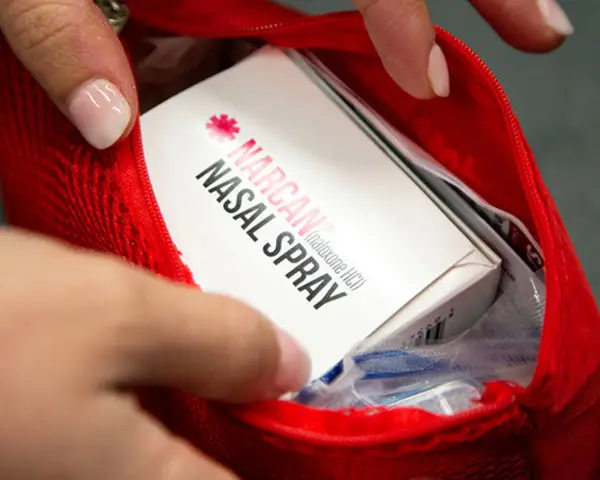
RTI International’s Support of Opioid Research and the National Institutes of Health’s Helping to End Addiction Long-term® Initiative
The Helping to End Addiction Long-term® Initiative, or NIH HEAL Initiative®, is an ambitious, multiyear effort to learn about the physical, mental, and societal impacts of the U.S. opioid crisis and to increase knowledge of effective, large-scale addiction treatment and support measures. According to the most recent population-wide study of drug use, more than 9.5 million people aged 12 or older in 2020 reported misusing opioids in the past year—so meaningful opioid misuse solutions will need to address mental health treatment and alternative solutions for pain management across populations. This initiative devotes millions of dollars to projects across the nation that are surveying and studying the public health impact of addiction, overdose treatment, and patient rehabilitation.
What Is Opioid Use Disorder?
Opioid use disorder (OUD) is a condition characterized by physical dependence on opioids—particularly illicit substances, such as heroin; synthetic opioids, such as fentanyl; and prescription opioids. OUD is a type of substance use disorder (SUD), a mental illness that affects a person’s biology as well as their behavior and leads them to lose control over consuming harmful substances such as alcohol, prescription medications, or illegal drugs. The advent and spread of fentanyl, an extremely powerful synthetic opioid with effects that are hundreds of times stronger than earlier compounds like oxycodone hydrochloride, and heroin, have further complicated the opioid crisis.
National Impact of Opioid Misuse and the Overdose Epidemic
Since 1999, the combined number of deaths due to intentional or unintentional opioid overdose has more than quadrupled in the U.S., and communities across the country are experiencing the fallout. In 2019, the number of deaths from opioid overdose rose to nearly 50,000, compared to 21,000 deaths in 2010. This relentless rise of opioid deaths has been linked to several factors; the NIH HEAL Initiative is aimed at deciphering each factor’s relative contribution and testing strategies for mitigating all factors.
Learn more about how RTI supports the NIH HEAL Initiative through the following projects:
- HEALing Communities Study
- Natural Observation Study to Evaluate the Effectiveness of Fentanyl Test Strip Strategies (Stay Safe Study)
- HEAL Prevention Cooperative (HPC)
- HEAL Initiative Data Stewardship
- HEAL Harm Reduction Policies, Practices, and Modes of Delivery Coordinating Center
- Assessing the Reach, Effectiveness, and Implementation of Multiple Harm Reduction Interventions
- Advancing Clinical Trials in Neonatal Opioid Withdrawal Syndrome (ACT NOW) Program: ACT NOW Longitudinal Study
- Eating, Sleeping, Consoling for Neonatal Opioid Withdrawal (ESC-NOW) Trial
- ACT NOW Trial to Shorten Pharmacologic Treatment of Newborns With NOWS (Weaning Trial)
- HEAL Evaluation of Limited Pharmacotherapies for Neonatal Opioid Withdrawal Syndrome Trial (HELP for NOWS)

HEALing Communities Study
Funding Institute: National Institute on Drug Abuse (NIDA)
The largest study of its kind in addiction science, the HEALing Communities Study (HCS), is coordinating with 67 communities in four states that have been deeply impacted by the opioid epidemic: Kentucky, Massachusetts, New York, and Ohio. In each locality, investment and support empower community leaders and public health officials to implement the opioid overdose prevention and addiction treatment interventions that they think will be most appropriate in their region—with the aim of increasing efficacy, improving treatment outcomes, and significantly reducing opioid-related deaths.
RTI is supporting local efforts and coordinating between study sites by
- Tracking each local group’s interventions by amount of materials distributed and number of individuals reached, along with publicly available data that reflect opioid harm—including number of emergency room visits, hospitalizations, and deaths related to opioid overdose—in that area
- Acting as the Data Coordinating Center (DCC) between each study site, managing defining rules, and importing data from studies and surveys
- Providing communications support for each local public health initiative
- Building standard study infrastructure for each team, including community dashboards that support data-informed decision-making.

Natural Observation Study to Evaluate the Effectiveness of Fentanyl Test Strip Strategies (Stay Safe Study)
Funding Institute: NIDA
Fentanyl is a synthetic opioid that is up to 50 times stronger than heroin and 100 times stronger than morphine. Illicit fentanyl is present in street and online drug markets in multiple forms, including as a solo product, combined with heroin or stimulants as a mixed product, and in counterfeit pills and tablets sold as prescription-equivalent opioids, stimulants, or benzodiazepines. This unknown factor presents significant challenges in gauging potency and dose concentration, which increases overdose risk. Fentanyl test strips (FTS) can detect the presence of fentanyl in many drugs—such as cocaine, methamphetamine, or heroin—and drug forms. FTS are a simple and inexpensive method of harm reduction to avert overdoses.
The Stay Safe Study is an observational study in Kentucky, New York, and Ohio that assesses the impact of FTS on overdose risk reduction behaviors over a 28-day period. Additionally, the project, which is a substudy of the HCS, will:
- Examine how contextual factors promote or impede the use of FTS
- Inform intervention strategies to promote the use and distribution of FTS as a critical component of an overdose prevention strategy
Experts

Preventing Opioid Use Disorder in Older Adolescents and Young Adults (HPC)
Funding Institute: NIDA
Data show that opioid overdose has become the leading cause of drug-involved overdose death for Americans of all ages. Annual overdose deaths among adolescents and young adults have more than doubled since 1999, a trend that shows no sign of abating. According to NIDA, heroin and other illicit opioids as well as common prescription opioids were involved in 85% of all overdose deaths in young people ages 15–24 in 2019, the most recent year for which the institute has published data.
The NIH HEAL Prevention Cooperative (HPC) supports the development and dissemination of strategies to prevent opioid misuse and OUD among this population. The HPC consists of 10 research projects that are working to test preventive intervention strategies through individual and coordinated approaches; HPC’s purpose is to enhance knowledge related to opioid misuse and OUD prevention among adolescents and young adults between the ages of 15 and 30.
How RTI Supports This Opioid Misuse Prevention Initiative
The NIH HEAL Prevention Coordinating Center (HPCC) at RTI supports individual HPC research projects and works to generate shared insights by collecting, analyzing, and reporting data across projects. The individual HPC opioid use research projects will provide a subset of common study data elements to the HPCC. In turn, the HPCC will prepare the collective HPC data sets and supporting documentation for an NIH-identified data repository to make the data sets available for secondary data analysis.
The HPCC conducts opioid misuse prevention research activities under five specific aims:
- Facilitate HPC coordination and communication, including the dissemination of systematic reviews and other scholarly works.
- Provide implementation science consultation and facilitate implementation research that spans HPC research projects.
- Establish data infrastructure.
- Provide data harmonization as well as methodological and statistical consultation; lead and facilitate cross-project investigations on etiology and prevention of opioid misuse and disorder.
- Support economic evaluation across research projects.
Experts

NIH HEAL Initiative Data Stewardship
Funding Institute: Office of the Director, NIH
RTI and the Renaissance Computing Institute (RENCI) at the University of North Carolina at Chapel Hill recognize the pressing need for an ambitious, trans-agency approach to the opioid and pain management health crisis. By working with NIH HEAL Program Officials, the NIH HEAL Data Platform hosted by the University of Chicago, and all NIH HEAL Investigators, RTI and RENCI are helping to build an NIH HEAL Ecosystem that will modernize the data infrastructure to ensure HEAL studies serve as a vital resource for researchers to search, access, share, store, and compute across diverse NIH HEAL data types to accelerate scientific solutions to the national opioid crisis.
The NIH HEAL Data Stewardship Group ensures that NIH HEAL data are Findable, Accessible, Interoperable, and Reusable (FAIR) within this ecosystem by working with all NIH HEAL DCCs and studies to develop processes for data harmonization, data storage, metadata collection, and sharing within a federated data ecosystem. By providing strategies for data sustainability, data search, and data federation and access, the NIH HEAL Data Stewardship Group fosters collaboration and data sharing that will continue to serve the NIH HEAL program going forward.
RTI supports the NIH HEAL Ecosystem by
- Leading the ecosystem’s engagement effort
- Providing data management oversight and consultancy
- Developing knowledge graph–based semantic search powered by use cases.
Learn more by visiting https://www.healdatafair.org/ and view our webinar series on our YouTube channel.
Read the latest RTI Press Paper—From competition to collaboration: Fostering a culture of data sharing in the NIH HEAL Data Ecosystem—which explores challenges of data sharing, potential incentives, and strategies the HEAL Data Ecosystem uses to build a supportive data-sharing community.
Experts

HEAL Harm Reduction Policies, Practices, and Modes of Delivery Coordinating Center
Funding Institute: NIDA
The NIH HEAL Initiative’s Harm Reduction Research Network will develop studies to test the effectiveness of intervention strategies in different community settings to inform efforts to save lives. The research network builds on existing harm reduction research and represents the largest pool of funding from NIH to date to examine evidence-based strategies to address overdose deaths. The coordinating center at RTI will provide scientific coordination and function as the operational hub for the network’s nine research projects. The work of the network will strengthen the body of evidence for intervention strategies and improve the lives of people who use drugs by aiming to prevent, minimize, and eliminate the risks associated. Key responsibilities of the coordinating center include:
- Providing scientific coordination and communication
- Developing common data elements to support data harmonization
- Convening key stakeholders for community engagement
- Championing scientific dissemination and translation of evidence for research and clinical practice

Assessing the Reach, Effectiveness, and Implementation of Multiple Interventions
Funding Institute: NIDA
In partnership with the HEAL Initiative’s Harm Reduction Research Network, this RTI-led project evaluates various innovative harm reduction strategies in San Francisco. It aligns with the network’s other projects in investigating intervention strategies to measure their reach, effectiveness, adoption, implementation, and maintenance in preventing drug overdoses and other adverse outcomes. The team will be conducting four annual cross-sectional studies of people who inject or smoke drugs, using surveys to assess their level of exposure to various interventions and associated reach and effectiveness outcomes associated with drug use such as overdoses, soft tissue infections, and HIV. It will also entail annual qualitative interviews of operations staff at all local harm reduction organizations to help assess adoption, implementation, and sustainability of harm reduction interventions. This project will enable experts to evaluate:
- Changes in reach of intervention initiatives
- Best implementation practices of initiatives
- Impact of interventions on individual health outcomes

Advancing Clinical Trials in Neonatal Opioid Withdrawal Syndrome (ACT NOW) Program: ACT NOW Longitudinal Study
Funding Institute: Eunice Kennedy Shriver National Institute of Child Health and Human Development (NICHD)
Infants born to mothers who took opioids during pregnancy often already have a physical dependence on the substances they ingested through their mothers’ bloodstreams in utero, leading to infant opioid withdrawal. Mothers may take doctor-prescribed opioids during pregnancy to reduce pain associated with a chronic condition or following an injury or a medical procedure. Mothers may also take opioids for other reasons, such as opioid misuse. The ACT NOW Longitudinal Study Consortium is conducting the Outcomes of Babies With Opioid Exposure Study, which examines the medical, neuroanatomical, neurodevelopmental, behavioral, social, and familial outcomes for infants who were exposed to opioids in utero. This study follows opioid-exposed infants for 2 years after birth to record any differences in brain development and any deficits in social or behavioral milestones compared to babies who were not exposed to opioids before birth. The study also aims to explore how specific factors—including different antenatal and postnatal exposures; severity of neonatal opioid withdrawal; maternal stress, depression, and/or parenting; and home environment—modify the effects of antenatal opioid exposure on the trajectory of brain development.

Eating, Sleeping, Consoling for Neonatal Opioid Withdrawal (ESC-NOW) Trial
Funding Institute: Eunice Kennedy Shriver National Institute of Child Health and Human Development (NICHD)
In collaboration with the Institutional Development Awards (IDeA) States Pediatric Clinical Trials Network (ISPCTN), part of the NIH Environmental influences on Child Health Outcomes (ECHO) Program, the ESC-NOW trial will evaluate the efficacy of various treatment protocols for infants born with neonatal opioid withdrawal syndrome (NOWS). The Eating, Sleeping, Consoling (ESC) approach for postnatal care of infants with NOWS is among the newest to show promise in treating infant opioid withdrawal and demonstrating that infants are medically ready for discharge. The ESC protocol is being compared to the current standard using the Finnegan Neonatal Abstinence Scoring Tool. The trial uses an innovative stepped wedge cluster randomized design to evaluate safety and efficacy for the ESC approach and its impact on infant neurodevelopment; this design also assesses wellness for mother and baby. The trial is currently ongoing at 24 sites across the U.S., evaluating infants from birth to 2 years.

ACT NOW Trial to Shorten Pharmacologic Treatment of Newborns With NOWS (Weaning Trial)
Funding Institute: Eunice Kennedy Shriver National Institute of Child Health and Human Development (NICHD)
In collaboration with the ISPCTN and NIH ECHO Program, this weaning trial concerns infants receiving methadone or morphine as the primary treatment for NOWS. The current treatment standard reduces dosage of either of these medications by 10% at a time, and the study evaluates slightly larger reductions of 15% at a time, to allow infants with NOWS to be discharged more quickly. Trained examiners in Neonatal Intensive Care Units assess neurobehavioral development in these infants to ensure the infants are healthy before discharge. The study will also involve regular follow-up with mothers and infants to ensure maternal well-being, observe maternal-infant attachment, and assess infant neurodevelopment through 2 years of age. This currently ongoing individually randomized, parallel groups, double blind trial will thus evaluate whether an early stop weaning protocol for morphine and methadone in infants treated for NOWS can safely decrease the number of days of infant opioid treatment. Both traditional frequentist and Bayesian methods will be used to derive actionable inference from trial data to help inform future clinical practice in this area.

HEAL Evaluation of Limited Pharmacotherapies for Neonatal Opioid Withdrawal Syndrome Trial (HELP for NOWS)
Funding Institute: Eunice Kennedy Shriver National Institute of Child Health and Human Development (NICHD)
RTI serves as the DCC for the HEAL Evaluation of Limited Pharmacotherapies for Neonatal Opioid Withdrawal Syndrome Trial (HELP for NOWS) Consortium. RTI’s services support the design and implementation of a multicenter, comparative effectiveness, randomized, controlled trial to assess the optimal pharmacological treatment for NOWS that informs clinical practice guidelines. These NOWS trials will compare the efficacy of morphine, methadone, and buprenorphine in treating NOWS so that the trials can rapidly translate to use in clinical practice. RTI will play a leadership role in standardizing trial design, statistical methods, data and study management, quality assurance, reporting, and regulatory support for the HELP for NOWS Consortium. As the DCC, RTI will also ensure NOWS clinical trials are feasible, efficient, and scientifically rigorous—and that they ultimately communicate trial results.
Learn More
RTI is proud to support evidence-based solutions to the opioid crisis. Learn more about our efforts.
Interested in learning more about RTI's substance misuse work?
Contact our experts using the form below.
- National Institutes of Health (NIH)


























